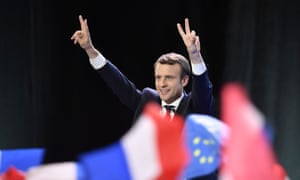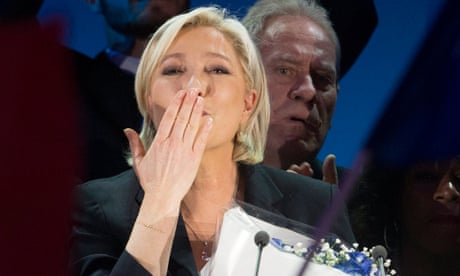 French presidential candidate Emmanuel Macron delivers a speech in Paris after the first round vote.
French presidential candidate Emmanuel Macron delivers a speech in Paris after the first round vote. Emmanuel Macron has told ecstatic supporters in Paris that he intends to govern for all of France as he emerged from a first-round vote as the clear favourite to become the country’s next president.
Appearing at a celebration rally in Porte de Versailles with his wife Brigitte after projections gave him a slender lead over Marine Le Pen on Sunday, Macron delivered a speech that, at times, sounded like he had won the vote outright.
“The challenge is to open a new page in our political life and to take action so that everyone is able to find his or her place in France and in Europe,” he told supporters, who greeted him chanting “Macron Président.”
“I want to be the president of all the people of France, for the patriots facing the threat of nationalism.”
Macron, who styled himself as a liberal progressive outsider who would revolutionise politics, appealed to enough voters to get into the 7 May second round; early projections put him at the head of the field with about 24% of the vote – a success that has bucked the global trend towards protectionism and nationalism.
At 39, Macron is by far the youngest person to ever have a chance at the French presidency and has risen to the fore despite never having stood in any kind of election before.
He styled himself as a progressive maverick who was “neither left nor right”, economically liberal, pro-business but leftwing on social issues. He did not have the backing of a traditional political party, had no constituency or firm voter base and was a complete unknown four years ago.
The Guardian view on France’s election: a win for Macron and hope
Editorial: In the first round in the race for the Élysée, the postwar parties have been humbled. France has voted for change
Read more
When presidential opponents questioned his standing and experience – as they were quick to do after the Champs-Elysées attack on police last week – he responded that France’s complacent, ineffective political class and the lacklustre political parties which have clung in power for decades had shown experience meant very little. He promised a “democratic revolution” against the “vacuous”, moribund French political system he felt voters had come to loathe.
Macron’s critics for a long time called him a “champagne bubble” that would burst. A former investment banker in a country where voters distrusted banks, he had been appointed as economy minister by François Hollande. He quickly became the most popular minister. He also served as a presidential adviser in the gilded anti-chambers of the Elysée palace – effectively the architect of Hollande’s pro-market, business-friendly reforms that so alienated voters on the left.
Macron’s presidential bid was a mass of contradictions, critics complained. He was a member of the elite top tier of the civil service, on friendly terms with business leaders and powerbrokers, yet vowed to fight the “system”.
He believed in always smiling and being optimistic, offering what he called “hope and courage in the face of resignation”, yet he was seeking election in one of the most pessimistic countries in the world, where people were exhausted by decades of mass unemployment and repeated terror attacks. He championed free market globalisation, international trade deals and the European Union at a time when fear for the future meant protectionism and Euroscepticism were gaining ground.
Macron’s central message was that he was a modern, digitally-minded, international progressive who could make the centre fashionable again, bucking the global trend for a return to nationalism and extremes.
It was hard walking a centrist tightrope, pleasing both left and right. He promised better democratic accountability yet said he would spend his first summer pushing through labour reforms by presidential decree.

Marine Le Pen heads to the rust belt to celebrate French election success
Read more
There was not a catchy, headline manifesto pledge that immediately stood out in voters’ minds but there was a set of what he called pragmatic plans: streamlining the pension system, expanding unemployment benefits but better controlling them, freeing a majority of households from housing tax and cutting charges and red tape for businesses. He said he wanted a more inclusive society and described France’s colonial past in Algeria as a “crime against humanity”, before tempering the statement.
Sitting in his shirt sleeves, eating ready meal lunches in the airless meeting rooms where he organised the first phase of his campaign, Macron would confide to visitors that the French political system was long broken and that he intended to build something new in its place – with more women and more people from civil society in parliament seats. The political movement, En Marche!, was free to join online and swiftly exceeded membership of Hollande’s ruling Socialist party. It promoted meetings in bistros and cafés where members could thrash out manifesto ideas, having their say in his project.
But what stood out was how much Macron’s presidential campaign was centred on his own persona. He gave the movement his own initials. There was no campaign director and few recognisable spokespeople – instead the spotlight and decision-making fell firmly on him.
On stage at rock star-style stadium gigs, he smiled and raise his outstretched arms to the sky. He called politics “mystic”. He believes that ever since king Louis XVI’s head was chopped off in the revolution, France has been constantly trying to compensate for the lack of a true leader figure who could personify France. The postwar president General de Gaulle fitted the bill, he had argued but, since then, the increasingly “ordinary” characters who served as French president had left a kind of “empty seat at the heart of political life”. Macron boldly presented himself as the young face who could embody the nation.
The question is whether Macron has understood the pessimism in France and its causes and whether he can address them. He argues that he has.
During the campaign, one leftwing voter, an IT worker in Angers, said he worried about Macron’s championing of the globalisation that had made so many working class people angry and sceptical of the ruling class. “I can’t vote for Macron because he hasn’t understood why people vote Marine Le Pen,” the voter said. “Which means he’ll repeat all the same policy mistakes and in five years’ time we’ll have Le Pen in power.”
Some say Macron’s rise has been down to luck and circumstance. Hollande’s decision not to run again for office and the defeat of the moderate Alain Juppé in the right’s primary race last autumn opened up the centre ground. When the rightwing favourite François Fillon was hit by scandal, it allowed Macron to overtake him in the polls. When the left-winger Benoît Hamon won the Socialist ticket, Macron could take a chunk of the centre left.
Macron’s team argue that he made his own luck. Far from a technocrat who suddenly saw a chance for power, Macron has been thinking about and strategising a political role for himself for a long time.

אין תגובות:
הוסף רשומת תגובה